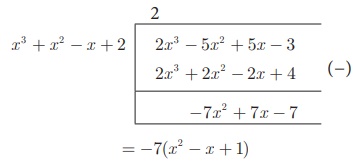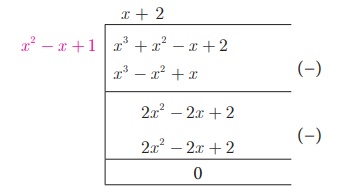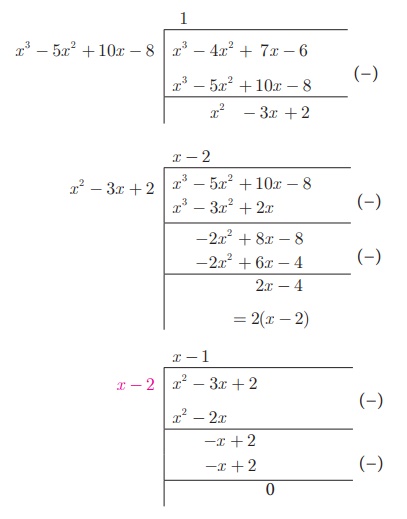Example, Solution | Algebra - Greatest Common Divisor (GCD) or Highest Common Factor (HCF) of Polynomials | 10th Mathematics : UNIT 3 : Algebra
Chapter: 10th Mathematics : UNIT 3 : Algebra
Greatest Common Divisor (GCD) or Highest Common Factor (HCF) of Polynomials
Greatest Common Divisor (GCD) or Highest Common Factor (HCF) of Polynomials
In our previous class we
have learnt how to find the GCD (HCF) of second degree and third degree
expressions by the method of factorization. Now we shall learn how to find the
GCD of the given polynomials by the method of long division.
As discussed in Chapter
2, (Numbers and Sequences) to find GCD of two positive integers using Euclidean
Algorithm, similar techniques can be employed for two given polynomials also.
The following procedure
gives a systematic way of finding Greatest Common Divisor of two given
polynomials f (x ) and g (x) .
Step 1 First, divide f(x)
by g (x) to obtain f (x
) = g (x )q (x
) + r (x) whereq (x)
is the quotient and r (x) is the remainder. Then, deg [r
(x)] < deg [g (x )]
Step 2 If the remainder r
(x) is non-zero, divide g (x) by
r (x) to obtain g (x
) = r (x )q (x
) + r1 (x ) where
r1 (x ) is the new remainder. Then deg [r1
(x) ] < deg [r (x )] . If the remainder r1
(x ) is zero, then r (x) is the required
GCD.
Step 3 If r1
(x ) is non-zero, then continue the process until we
get zero as remainder. The divisor at this stage will be the required
GCD.
We write GCD [f (x ), g(x)]
to denote the GCD of the polynomials f (x ), g (x
).
Note
If f (x
) and g (x) are two polynomials
of same degree then the polynomial carrying the highest coefficient will
be the dividend. In case, if both have the same coefficient then compare the
next least degree’s coefficient and proceed with the division.
Progress Check
1. When two
polynomials of same degree has to be divided, __________ should be considered
to fix the dividend and divisor.
2. If r (x
) = 0 when f(x) is divided by g(x) then g(x)
is called ________ of the polynomials.
3. If f (x
) = g (x )q (x ) + r (x), _________
must be added to f(x) to make f(x) completely
divisible by g(x).
4. If f (x
) = g (x )q (x ) + r (x), _________
must be subtracted to f(x) to make f(x) completely
divisible by g(x).
Example 3.10
Find the GCD of the
polynomials
x3 + x2 − x + 2 and 2x3 − 5x2 + 5x − 3 .
Solution
Let f (x ) = 2x 3 − 5x 2 + 5x – 3 and g (x) = x 3 + x 2
− x + 2

− 7(x 2
− x + 1) ≠ 0 , note that -7 is not a divisor of g (x)
Now dividing g (x)
= x3 + x2 − x + 2 by the new
remainder x2 − x +1 (leaving the constant factor), we
get

Here, we get zero
remainder
Therefore, GCD(2x
3 − 5x 2 + 5x − 3, x 3 + x
2 − x + 2) = x 2 − x + 1
Example 3.11
Find the GCD of 6x 3 − 30x 2 + 60x − 48 and 3x 3 − 12x 2 + 21x −18.
Solution
Let, f (x) = 6x 3 − 30x 2 + 60x − 48 = 6(x 3 − 5x 2 + 10x − 8) and g
(x) = 3x
3 − 12x 2 + 21x
− 18 = 3 (x 3 − 4x
2 + 7x − 6)
Now, we shall find the
GCD of x3 − 5x2 + 10x − 8 and x3
− 4x2 + 7x – 6

Here, we get zero as
remainder.
GCD of leading
coefficients 3 and 6 is 3.
Thus, GCD [(6x 3
− 30x 2 + 60x − 48, 3x 3 − 12x
2 + 21x − 18)] = 3(x −2) .
Related Topics